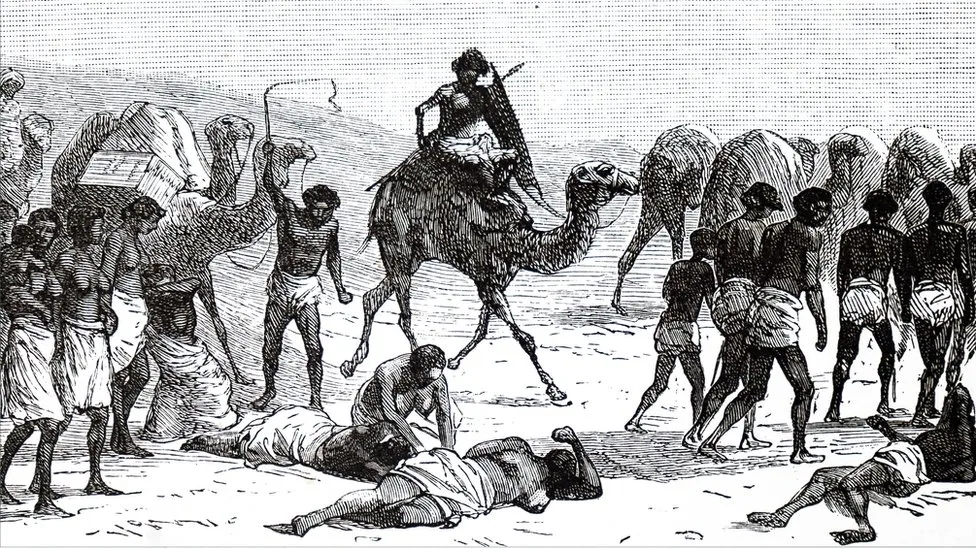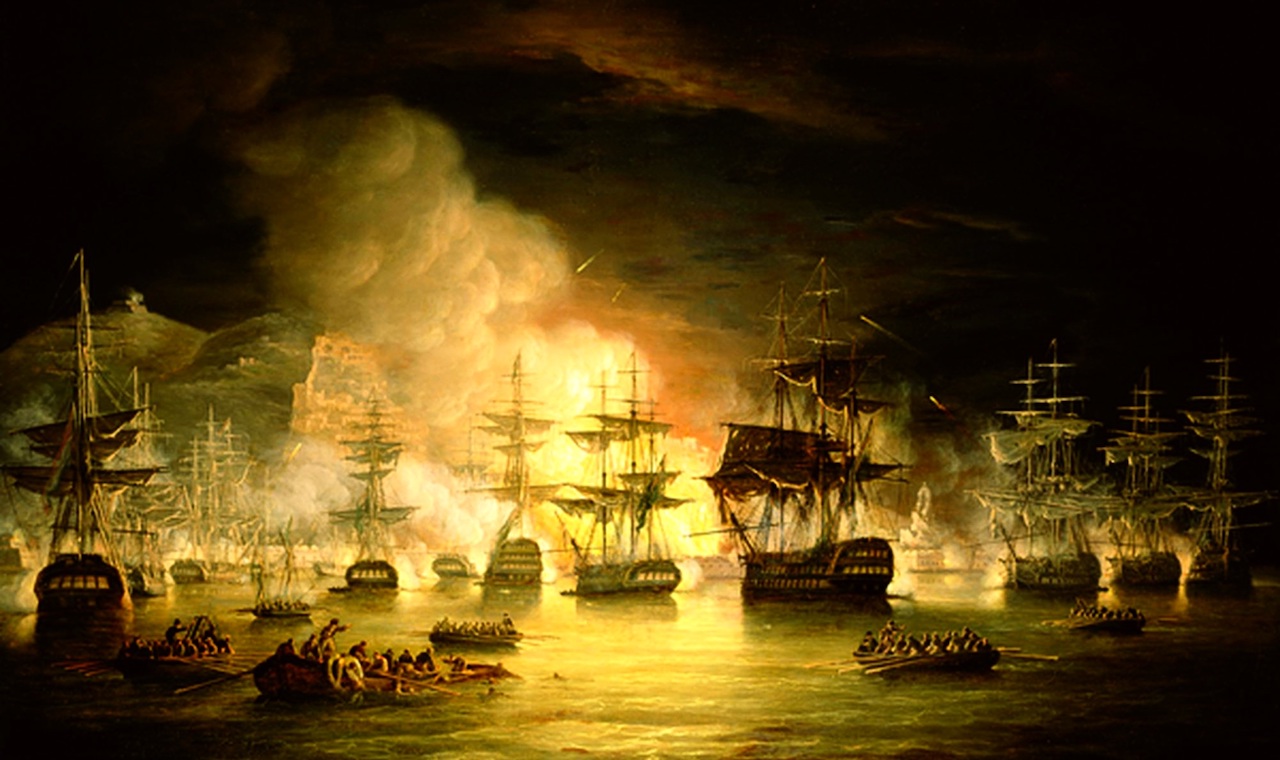Sunday, April 30, 2023
Modern Slavery on This Day in History
Saturday, April 29, 2023
The Largest White House State Dinner on This Day in History
Friday, April 28, 2023
Pink Floyd's Dark Side of the Moon on This Day in History
Thursday, April 27, 2023
The Barbary Wars on This Day in History
This day in history: United States Marines and Berbers attack the Tripolitan city of Derna on this day in 1805 as part of the Barbary Wars. The US at the time was trying to establish trade routes across the Atlantic, but they were often met by Barbary pirates from Northern Africa. These Muslim pirates would take the crew and anyone else on board and enslave them, unless a ransom or a tribute could be paid.
This had been going on for a long time. "Slavery knew no bounds of color or creed. During one period, from 1500 to 1700, there were more white European slaves held captive on the Barbary Coast than slaves sent from West Africa to the Atlantic world, according to Gordon [referring to Stewart Gordon and his book Shackles of Iron: Slavery Beyond the Atlantic]." Rich Lowry
"It wasn't until 1815 that the naval victories won by Commodores William Bainbridge and Stephen Decatur led to treaties ending all tribute payments. After a decisive victory in Algiers, Decatur sailed to Tunis and Tripoli, where he reached similar agreements, gaining reparations and the releases of American and European slaves...Americans under James Madison finally put a stop to the centuries-old practice of Barbary kidnapping, theft, terror, and slavery. From this early international victory in the Barbary Wars, the U.S. embarked on its journey to become one of the world's greatest military and economic superpowers." Source
Wednesday, April 26, 2023
A Baseball Fatality on This Day in History
Tuesday, April 25, 2023
The First Automobile License Plates on This Day in History
Monday, April 24, 2023
A Case of "Hysterical Strength" on This Day in History
This Day in History: One of the first widely publicized stories of "hysterical strength" happened on this day (April 24) in 1960 in Tampa, Florida, when Mrs. Florence Rogers, a 123-pound woman, lifted one end of a 3,600-pound car that had fallen off of a jack and onto her 16-year-old son, Charles Trotter. Mrs. Rogers, an LPN, fractured several vertebrae in the process.
Hysterical strength refers to a display of extreme physical strength by humans, beyond what is believed to be normal, usually occurring when people are in, or perceive themselves to be in life-or-death situations.
Other examples are:
18th of March 1915, Corporal Seyit Çabuk lifted bombshells that weighed 608 lb in the Gallipoli Campaign.
Before May 1962, Jack Kirby claims a woman lifted a car off her baby, which inspired him to create the Hulk.
In 1982, in Lawrenceville, Georgia, Tony Cavallo was repairing a 1964 Chevrolet Impala automobile from underneath when the vehicle fell off the jacks on which it was propped, trapping him underneath. Cavallo's mother, Mrs. Angela Cavallo, lifted the car high enough and long enough for two neighbors to replace the jacks and pull Tony from beneath the car.
In 1988, in Waialua, Hawaii, while working a construction contract two weeks after filming the finale for the television show Magnum P.I., pilot and Vietnam Veteran Steve Kux lost control of his Hughes 500D helicopter and crashed into a drainage ditch. His coworker, Warren Everal (also known as "Tiny") lifted the 1,400 pound helicopter enough to allow another person to remove Kux from the cockpit.
In 2006, Ivujivik, Quebec, resident Lydia Angiyou saved several children by fighting a polar bear until a local hunter shot the bear.
In 2006, in Tucson, Arizona, Tom Boyle watched as a Chevrolet Camaro hit 18-year-old Kyle Holtrust. The car pinned Holtrust, still alive, underneath. Boyle lifted the Camaro off the teenager, while the driver of the car pulled the teen to safety.
In 2009, in Ottawa, Kansas, 5 ft 7, 185 lb) Nick Harris lifted a Mercury sedan to help a 6-year-old girl pinned beneath.
In 2009, in Newport, Wales, Donna McNamee, Abigail Sicolo, and Anthony McNamee lifted a 1.1 ton Renault Clio off an 8-year-old boy.
In 2011, in Tampa, Florida, 6 ft 3 in, 295 lb University of South Florida college football player Danous Estenor lifted a 3,500 lb car off a man who had been caught underneath. The man was a tow truck driver who had been pinned under the rear tire of a 1990 Cadillac Seville, which had lurched forward as he worked underneath it. The man suffered only minor injuries.
In 2012, in Glen Allen, Virginia, 22-year-old Lauren Kornacki rescued her father, Alec Kornacki, after the jack used to prop up his BMW slipped, pinning him under it. Lauren lifted the car, then performed CPR on her father and saved his life.
In 2012, in Michigan, Austin Smith (age 15) lifted a car to save his grandfather pinned underneath.
In 2013, in Oregon, teenage sisters Hannah (age 16) and Haylee (age 14) lifted a tractor to save their father pinned underneath.
In 2013, in Salvage, Newfoundland and Labrador, Cecil Stuckless, a 72-year-old man lifted a Jeep to save his son-in-law pinned underneath.
In 2015, in St. John's, Newfoundland, Nick Williams lifted a four-wheel-drive vehicle to save a young boy pinned beneath its tire.
In 2017, in Temple Terrace, Florida, Kenny Franklin, lifted an SUV from a state trooper after an accident.
In 2019, in Ohio, Zac Clark, a 16-year-old football player, lifted a 3,000 lb car when he heard his neighbor call for help.
Sunday, April 23, 2023
Russian President Boris Yeltsin on This Day in History
This day in history: Russian politician and president, Boris Yeltsin, died on this day (April 23) in 2007.
One of my favorite stories from Yeltsin was from his visit to Randalls grocery store in Clear Lake Texas.
"On Sept. 16, 1989, Boris Yeltsin was a newly elected member of the Soviet Parliament visiting the United States. Following a scheduled visit to Johnson Space Center, Yeltsin and a small entourage made an unscheduled stop at a Randalls grocery store in Clear Lake, a suburb of Houston. He was amazed by the aisles of food and stocked shelves, a sharp contrast to the breadlines and empty columns he was accustomed to in Russia.
Yeltsin, who had a reputation as a reformer and populist, 'roamed the aisles of Randall’s nodding his head in amazement,' wrote Stefanie Asin, a Houston Chronicle reporter. He marveled at free cheese samples, fresh fish and produce, and freezers packed full of pudding pops. Along the way, Yeltsin chatted up customers and store workers: 'How much does this cost? Do you need special education to manage a supermarket? Are all American stores like this?'
Yeltsin was a member of the Politburo and Russia’s upper political crust, yet he’d never seen anything like the offerings of this little American grocery store. 'Even the Politburo doesn’t have this choice. Not even Mr. Gorbachev,' Yeltsin said." Source
"About a year after the Russian leader left office, a Yeltsin biographer later wrote that on the plane ride to Yeltsin’s next destination, Miami, he was despondent. He couldn’t stop thinking about the plentiful food at the grocery store and what his countrymen had to subsist on in Russia.
In Yeltsin’s own autobiography, he wrote about the experience at Randall’s, which shattered his view of communism, according to pundits. Two years later, he left the Communist Party and began making reforms to turn the economic tide in Russia. You can blame those frozen Jell-O Pudding pops.
'When I saw those shelves crammed with hundreds, thousands of cans, cartons and goods of every possible sort, for the first time I felt quite frankly sick with despair for the Soviet people,' Yeltsin wrote. 'That such a potentially super-rich country as ours has been brought to a state of such poverty! It is terrible to think of it.'" Source
Saturday, April 22, 2023
German Philosopher Immanuel Kant on This Day in History
Perhaps Jason Brennan is right:
"Just as Einstein’s field equations aren’t particularly useful for studying the path of a falling feather, so Kant’s CI isn’t particularly useful to know what to do in a given situation."
https://fee.org/articles/what-do-you-need-philosophy-for/
See also 350 Books on German Philosophy to Download (Kant, Nietzsche,
Schopenhauer, Hegel)
http://thebookshelf2015.blogspot.com/2015/10/350-books-on-german-philosophy-on.html
Dissing Immanuel Kant
https://thebookshelf2015.blogspot.com/2015/10/dissing-immanuel-kant.html
Theosophy and Immanuel Kant by H. T. Edge, M. A. 1916
https://thebookshelf2015.blogspot.com/2018/02/theosophy-and-immanuel-kant-by-h-t-edge.html
Friday, April 21, 2023
A Cluster Ballooning Fatality on This Day in History
Thursday, April 20, 2023
An 1897 UFO Incident on This Day in History
Wednesday, April 19, 2023
Waco, the CSA and the Oklahoma City Bombing on This Day in History
Tuesday, April 18, 2023
Actor James Woods on This Day in History
Monday, April 17, 2023
The Rise of the English Language on This Day in History
Sunday, April 16, 2023
Mass Murders on this Day in History
Alchemy, the Philosopher's Stone and the Esoteric - 100 Books to Download
Saturday, April 15, 2023
The Death of the Largest Snake Ever on This Day in History
Friday, April 14, 2023
Killed by a Swan on This Day in History
Thursday, April 13, 2023
Free Speech Absolutist Christopher Hitchens on This Day in History
As John Stuart Mill* said, if all of society were agreed on the truth and beauty and value of one proposition, all except one person it would be most important in fact it would become even more important that that one heretic be heard because we would still benefit from his perhaps outrageous or appalling view.
In more modern times this has been put I think best by a personal heroine of mine Rosa Luxemburg, who said that "the freedom of speech is meaningless unless it means the freedom of the person who thinks differently."
He says of the holocaust denier: "That person doesn't just have a right to speak, that person's right to speak must be given extra protection because what he has to say must have taken him some effort to come up with." He follows this with: "One of the proudest moments of my life, that's to say in the recent past, has been defending the British historian David Irving who is now in prison in Austria for nothing more than the potential of uttering an unwelcomed thought on Austrian soil."
*[John Stuart Mill's quote is, “If all mankind minus one were of one opinion, and only one person were of the contrary opinion, mankind would be no more justified in silencing that one person than he, if he had the power, would be justified in silencing mankind.”]
Wednesday, April 12, 2023
The Civil War on This Day in History
220 Books on the American Civil War to Download
The Dark Side of Abraham Lincoln - Over 50 Books to Download
































